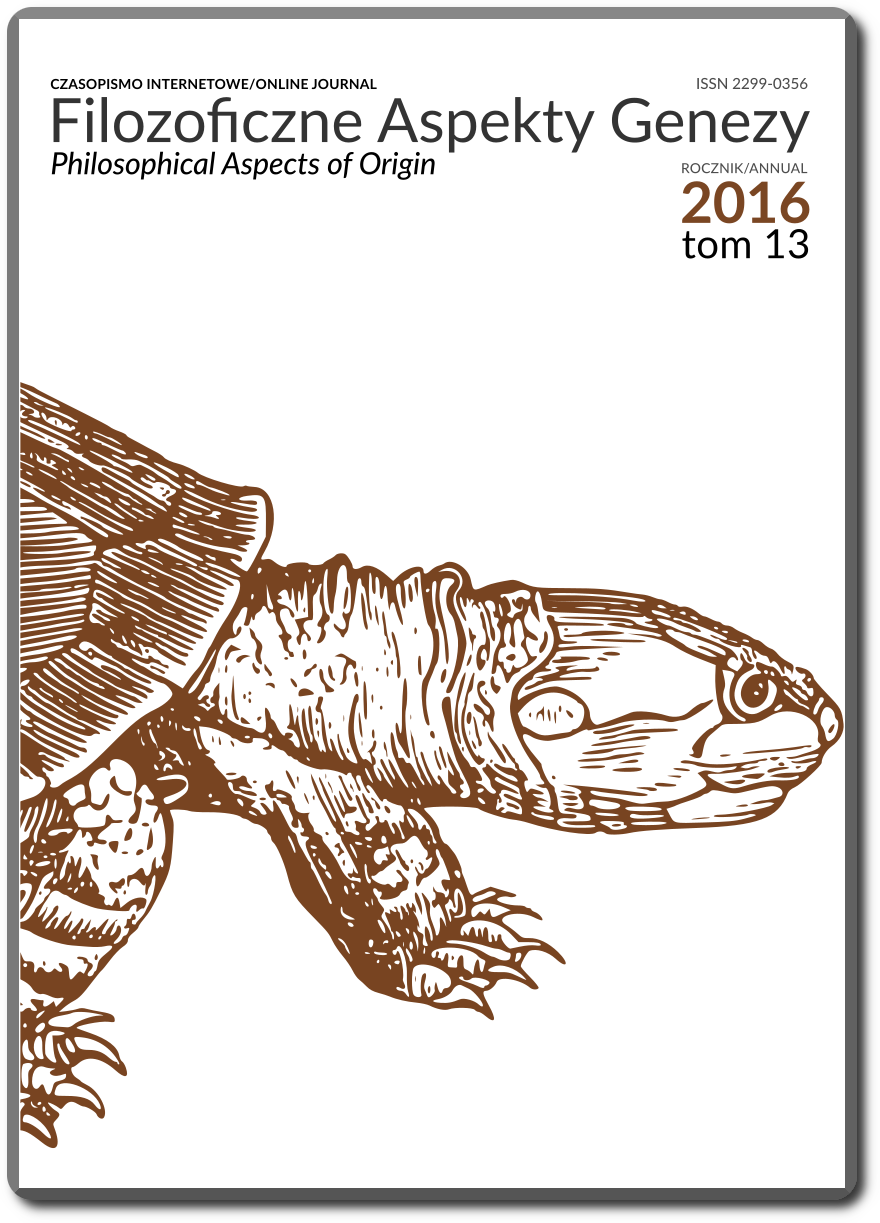Opublikowane 24.05.2021
Słowa kluczowe
- chrześcijaństwo,
- teizm,
- naturalizm,
- empiryzm,
- krytyczny realizm
- relatywizm,
- założenie uszczegóławiające ...More

Utwór dostępny jest na licencji Creative Commons Uznanie autorstwa 4.0 Międzynarodowe.
Jak cytować
Abstrakt
Powszechny stał się pogląd, że nie tylko fakty, ale i osobiste oraz wspólne przekonania stanowią element wiedzy naukowej. Rodzi to dwa ważne pytania. Jak ludzie mający bardzo odmienne systemy przekonań mogą wspólnie uprawiać naukę? Czy wiedzy naukowej można ufać, skoro jest kształtowana i niekiedy zniekształcana przez przekonania funkcjonujące na zapleczu nauki? Zacznę od wskazania, że uczeni, którzy wierzą w istnienie rzeczywistości niezależnej od umysłu, mają moralny obowiązek przeciwstawiania się zniekształcaniu ich wiedzy o zjawiskach przyrodniczych. Następnie wyjaśniam, dlaczego przekonania towarzyszące są konieczne do formułowania teorii w nauce. Argumentuję, że przekonania towarzyszące niekoniecznie zniekształcają wiedzę naukową, ponieważ Bóg stworzył obiektywnie istniejącą rzeczywistość, która opiera się zniekształceniu. Gdy dochodzi do zniekształceń, nauka dysponuje standardowymi sposobami ich wykrywania. Sposoby te to między innymi zbieżność wzajemnie niezależnych linii danych empirycznych prowadzących do tego samego wyjaśnienia, możliwość odłączenia przekonań towarzyszących od wyjaśnień naukowych oraz autodestrukcyjność przekonań towarzyszących prowadzących do dogmatyzmu. Później pokazuję, że w swojej pracy naukowcy w istocie przeciwstawiają się własnym przekonaniom towarzyszącym. Zgodnie z moim wnioskiem przekonania towarzyszące naukowców nie dyktują treści wiedzy naukowej, zaś ludzie mający odmienne systemy przekonań, w tym chrześcijanie, mogą wspólnie prowadzić badania naukowe. Nie opowiadam się jednak za powrotem do chrześcijańskiej formy neopozytywizmu, ponieważ w pełni biorę pod uwagę to, czego dowiedzieliśmy się przez ostatnie kilkadziesiąt lat o tym, w jakim stopniu nauka osadzona jest w kontekście społeczno-kulturowym.
Downloads
Bibliografia
- Barbour Ian G., „Commentary on Theological Resources from the Physical Sciences”, Zygon 1966, vol. 1, s. 27-30.
- Barbour Ian G., „Theology and Physics Forty Years Later”, Zygon 2005, vol. 40, s. 507-512.
- Bowler Peter J. and Morus Ivan R., Making Modern Science, University of Chicago Press, Chicago 2005.
- Brooke John H., Science and Religion: Some Historical Perspectives, Cambridge University Press, Cambridge 1991.
- BrookE John H., Osler Margaret J., and Van Der Meer Jitse M. (eds.), Science in Theistic Contexts: Cognitive Dimensions, University of Chicago Press, Chicago 2001.
- Carson Hampton L., „Inversions in Hawaiian Drosophila”, w: Krimbas and Powell (eds.), Drosophila Inversion Polymorphism…, s. 407-439 (streszczenie tego tekstu: http://bio.illinoisstate.edu/kaedwar/HawaiianDrosophila/CarsonTree.htm).
- Chalmers Alan, Science and Its Fabrication, Open University Press, Milton Keynes 1990.
- Crick Francis, Of Molecules and Men, University of Washington Press, Seattle, Washington 1966.
- Darwin Charles, list do W. Grahama z 3 lipca 1881 roku, w: Darwin (ed.), The Life and Letters of Charles Darwin…, s. 285.
- Darwin Francis (ed.), The Life and Letters of Charles Darwin, vol. 1, Elibron, Boston 2005 (1887).
- Descartes René, Zasady filozofii, przeł. Izydora Dąmbska, wyd. 2, Biblioteka Europejska, Antyk, Kęty 2001.
- Dooyeweerd Herman, A New Critique of Theoretical Thought, vol. 2, The Presbyterian and Reformed Publishing, Nutley, New Jersey 1969.
- Espinoza Fernando, „An Analysis of the Historical Development of Ideas about Motion and Its Implications for Teaching”, Physics Education 2005, vol. 40, no. 2, s. 139-146, http://tiny.pl/gcszj (11.09.2016).
- Finocchiaro Maurice A., The Galileo Affair: A Documentary History, University of California Press, Berkeley, California 1989.
- Fleck Ludwik, Entstehung und Entwicklung einer wissenschaftlichen Tatsache. Einführung in die Lehre vom Denkstil und Denkkollektiv, Schwabe und Co., Verlagsbuchhandlung, Basel 1935.
- Fleck Ludwik, Powstanie i rozwój faktu naukowego. Wprowadzenie do nauki o stylu myślowym i kolektywie myślowym, przeł. Maria Tuszkiewicz, w: Fleck, Psychosocjologia poznania naukowego…, s. 31-163.
- Fleck Ludwik, Psychosocjologia poznania naukowego. Powstanie i rozwój faktu naukowego oraz inne pisma z filozofii poznania, red. Zdzisław Cackowski i Stefan Symotiuk, Wydawnictwo Uniwersytetu Marii-Curie Skłodowskiej, Lublin 2006.
- Fleck Ludwik, The Genesis and Development of a Scientific Fact, ed. T.J. Trenn and R.K. Merton, foreword by Thomas Kuhn, University of Chicago Press, Chicago 1979.
- Foster Michael B., „The Christian Doctrine of Creation and the Rise of Modern Natural Science”, Mind 1934, vol. 43, s. 446-448; 1935, vol. 44: 439-466; 1936, vol. 45, s. 1-27.
- Galileusz, Dialog o dwu najważniejszych układach świata: ptolemeuszowym i kopernikowym, przeł. Edward Ligocki, Arcydzieła Wielkich Myślicieli, Ediciones Altaya Polska & De Agostini Polska, Warszawa 2004.
- Grene Marjorie, „Biology and the Problem of Levels of Reality”, The New Scholasticism 1967, vol. 41, s. 94-123.
- Grene Marjorie, The Understanding of Nature: Essays in the Philosophy of Biology, Boston Studies in the Philosophy of Science, vol. 23, Reidel, Boston, Massachusetts 1974.
- G.W. Leibniz: Philosophical Essays, trans. and ed. Roger Ariew and Dan Garber, Hackett, Indianapolis, Indiana 1989.
- Haldane J.B.S., Possible Worlds: And Other Essays, Chatto and Windus, London 1927 (reprint 1932).
- Harrison Peter, The Fall of Man and the Foundations of Science, Cambridge University Press, Cambridge 2007.
- Hesse Mary, „Reductionism in the Sciences: Some Reflections on Part I”, w: Peacocke (ed.), Reductionism in Academic Disciplines…, s. 105-112.
- Howell R.W. and Bradley W.J. (eds.), Mathematics in a Postmodern Age: A Christian Perspective, Eerdmans, Grand Rapids, Michigan 2001.
- http://csep10.phys.utk.edu/astr161/lect/history/newtongrav.html.
- http://earthsci.org/education/teacher/basicgeol/platec/platec.html (07.09.2016).
- http://en.wikipedia.org/wiki/Hawaiian_Islands (08.09.2016).
- http://en.wikipedia.org/wiki/Plate_tectonics#cite_ref-17 (07.09.2016).
- http://tiny.pl/gcszn (08.09.2016).
- http://news.cnet.com/8301-1023_3-10438960-93.html (07.09.2016).
- http://www.beliefnet.com/columnists/scienceandthesacred/2009/08/why-i-think-the-new-atheists-are-a-bloody-disaster.html (11.09.2016).
- http://www.pbs.org/wgbh/nova/galileo/mistake.html (11.09.2016).
- http://www.physicalgeography.net/fundamentals/10i.html (07.09.2016).
- http://www.sjsu.edu/faculty/watkins/tides.htm (11.09.2016).
- http://www.visionlearning.com/library/module_viewer.php?mid=65 (07.09.2016).
- Hume Dawid, Badania dotyczące rozumu ludzkiego, przeł. Jan Łukasiewicz i Kazimierz Twardowski, Arcydzieła Wielkich Myślicieli, Ediciones Altaya Polska & De Agostini Polska, Warszawa 2001.
- Krimbas C.B. and Powell J.R. (eds.), Drosophila Inversion Polymorphism, CRC Press, Boca Raton, Florida 1992.
- Kuhn Thomas S., Struktura rewolucji naukowych, przeł. Helena Ostromęcka i Justyna Nowotniak, Fundacja Aletheia, Warszawa 2001.
- Leibniz Gottfried Wilhelm, „A New System of the Nature and Communication of Substances, and of the Union of the Soul and Body (1695)”, w: G.W. Leibniz…, s. 138-145.
- Losch Andreas, „On the Origins of Critical Realism”, Theology and Science 2009, vol. 7, s. 85-106.
- Midgley Mary, Science as Salvation, Routledge, London 1992.
- Nagel Thomas, Mind and Cosmos: Why the Materialist Neo-Darwinian Conception of Nature Is Almost Certainly False, Oxford University Press, Oxford 2012.
- O’Grady Patrick M. et al., „Polytene Chromosomes as Indicators of Phylogeny in Several Species Groups of Drosophila”, BMC Evolutionary Biology 2001, vol. 1, s. 1-6, http://www.biomedcentral.com/1471-2148/1/6 (08.09.2016).
- Peacocke Arthur (ed.), Reductionism in Academic Disciplines, The Higher Education Foundation, Guildford, Surrey 1985.
- Plantinga Alvin, Warrant and Proper Function, Oxford University Press, New York 1993, http://www.calvin.edu/academic/philosophy/virtual_library/articles/plantinga_alvin/naturalism_defeated.pdf (26.09.2016).
- Polanyi Michael, Personal Knowledge: Towards a Post-Critical Philosophy, University of Chicago Press, Chicago 1958.
- Polanyi Michael, The Tacit Dimension, Doubleday & Company, Garden City, New York 1966.
- Polkinghorne John, „The Metaphysics of Divine Action”, w: Russell, Murphy, and Peacocke (eds.), Chaos and Complexity…, s. 147-156.
- Robinson Marilynne, Absence of Mind: The Dispelling of Inwardness from the Modern Myth of the Self, Yale University Press, New Haven, Connecticut 2010.
- Russell Robert John, Murphy Nancey, and Peacocke Arthur (eds.), Chaos and Complexity: Scientific Perspectives on Divine Action, Vatican Observatory Publications — The Center for Theology and Natural Sciences, Vatican City State — Berkeley, California 1997.
- Salam Abdus, „Islam and Science”, w: C.H. Lai (ed.), Ideals and Realities: Selected Essays of Abdus Salam, 2nd ed., World Scientific, Singapore 1987, s. 179-213, http://www.globalwebpost.com/farooqm/study_res/abdus_salam/i_science.html.
- Strauss Erwin, The Primary World of Senses, Free Press of Glencoe, New York 1963.
- The Collected Works of Herman Dooyeweerd Series C-Dooyeweerd’s Living Legacy, vol. 1: Contemporary Reflections on the Philosophy of Herman Dooyeweerd, ed. D.F.M. Strauss, The Edwin Mellen Press, Lewiston, New York 2000.
- Van Brummelen Harro, „Mathematical Truth: A Cultural Study”, w: R.W. Howell and W.J. Bradley (eds.), Mathematics in a Postmodern Age: A Christian Perspective, Eerdmans, Grand Rapids, Michigan 2001, s. 45-64.
- Van Der Meer Jitse M., „Progress in Nature and Culture: How Biology Can Have the Best of Both Worlds” [recenzja książki: Michael RUSE, Monad to Man], Biology and Philosophy 2000, vol. 15, s. 759-772.
- Van Der Meer Jitse M., „The Actor in the Interaction of Science and Religion: An Application of Dooyeweerd’s Anthropology to the Study of Religion and Science Relations”, w: The Collected Works of Herman Dooyeweerd…, s. 183-194.
- Wolfe Charles T., „Teleomechanism Redux?: Functional Physiology and Hybrid Models of Life in Early Modern Natural Philosophy”, Gesnerus 2014, vol. 71, no. 2, s. 290-307.
- www.ceoe.udel.edu/deepsea/level-2/geology/vents.html.



